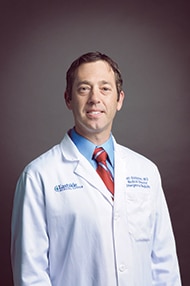
These new services include the addition of three new Urgent Care Centers, the new South Campus Emergency Department, as well as our continued growth at our main campus Emergency Department.
With many choices available to our community, people sometimes asks me which facility is the right choice for their family’s healthcare needs. Let me share with you some guidelines that may help you choose between heading to the urgent care center or the emergency department.
It’s best to understand the capabilities offered at the two different centers. Urgent care centers are able to perform basic lab tests, x-rays, and simple procedures. They are designed to take care of your less complicated healthcare needs in a short amount of time. Examples of conditions best cared for at the urgent care include:
• Accidents and falls
• Sprains and strains
• Moderate back problems
• Breathing difficulties (i.e. mild to moderate asthma)
• Bleeding/cuts — not bleeding a lot but requiring simple stitches
• Diagnostic services, including X- rays and laboratory tests
• Eye irritation and redness
• Fever or flu
•Vomiting, diarrhea, or dehydration
• Severe sore throat or cough
• Minor broken bones and fractures (i.e. fingers, toes)
• Skin rashes and infections
The emergency department is best suited to care for emergent conditions that may require an expanded array of medical testing such as labs, radiology studies such as CT scans, ultrasounds, MRI’s, and hospital admission or consultation with physician specialists. General conditions best evaluated and treated in the emergency department include:
• Severe chest pain or difficulty breathing
• Compound fracture (bone protrudes through skin)
• Convulsions, seizures, or loss of consciousness
• Fever in newborns
• Bleeding
• Traumatic injuries such as knife wounds and gunshots
• Burns
• Poisoning
• Serious head, neck, or back injury
• Pregnancy-related problems
• Severe abdominal pain
• Signs of a heart attack (i.e. chest pain, shortness of breath, nausea, and/or excessive sweating)
• Signs of a stroke (e.g. loss of vision, sudden numbness, weakness, slurred speech, or confusion)
• Suicidal or homicidal feelings
The emergency department typically has more resources available to diagnose and treat your medical condition and offers in-patient care if required.
Both the urgent care and emergency department provide much needed resources to our patients. Having the ability to choose between the two centers affords our patients the appropriate care delivered in the most efficient manner possible. Whether you require a more rapid urgent care visit or a more resource available emergency department visit, Eastside Medical Center is ready to exceed your health care needs and expectations.
Eastside Medical Center
Eastside Medical Center Main
Campus ER: 1700 Medical Way,
Snellville, GA, 30078
Eastside Medical Center South
Campus ER: 2160 Fountain Drive,
Snellville, GA, 30078
www.EastsideMedical.com

